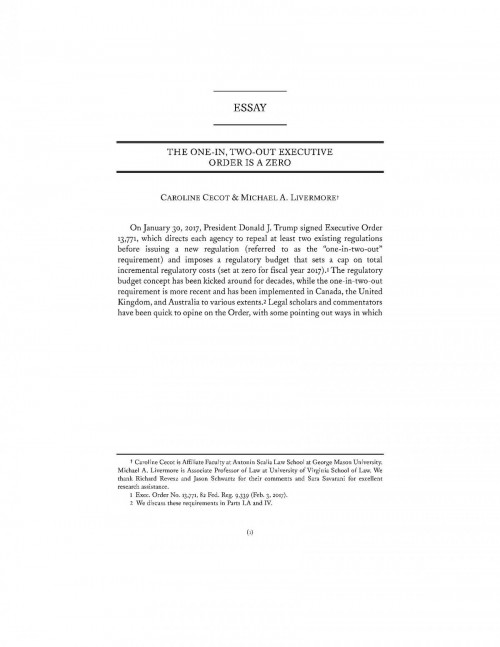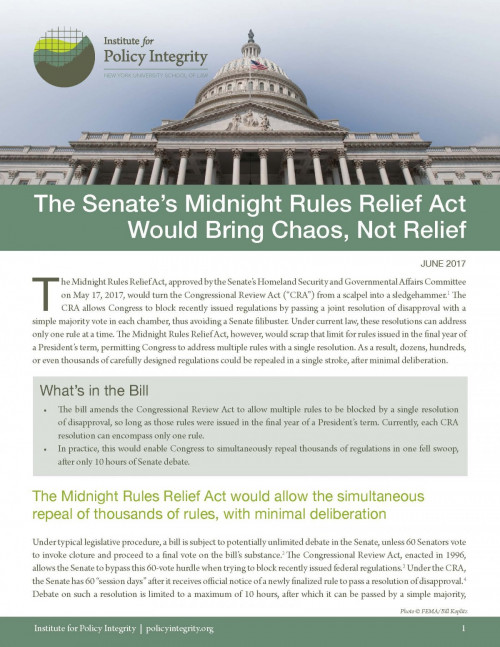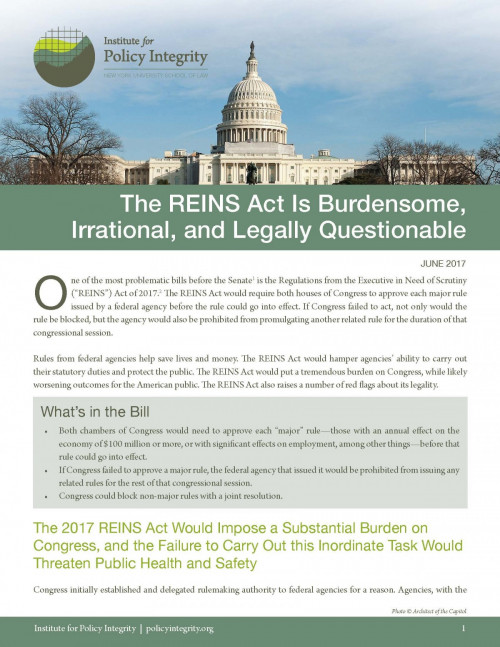-
Public Comments on Regulatory Review (Treasury, GSA, FEMA, State, DOJ, FCA, Interior)
Many federal agencies are requesting the public’s suggestions for rules to repeal or reform, tacitly implying that most regulations stifle economic growth. In comments to several agencies, we argue that regulatory review should consider the public benefits of regulation, not just the costs to regulated industries, and should prioritize review of rules for which actual costs and benefits diverge significantly from predicted costs and benefits.
-
Comments on FEMA’s Proposal on Public Petitions
The Federal Emergency Management Agency (FEMA) is proposing to update its regulations on the rulemaking process, which include amendments to how it accepts and considers public petitions for rulemaking. While the proposed changes are all appropriate, we offer additional changes that would increase government transparency in our comments to the agency.
-
Comments to the Department of Energy on Regulatory Burden
Following an Executive Order on reducing federal regulatory burden, the Department of Energy (DOE) is requesting the public’s suggestions for rules to repeal or reform. In our comments to DOE’s request for information, we argue that regulatory review should consider the public benefits of regulation, not just the costs to regulated industries.
-
Public Comments on Regulatory Review (HUD, MCSAC, FMC, NOAA, Coast Guard)
Many federal agencies are requesting the public’s suggestions for rules to repeal or reform, tacitly implying that most regulations stifle economic growth. In comments to several agencies, we argue that regulatory review should consider the public benefits of regulation, not just the costs to regulated industries, and should prioritize review of rules for which actual costs and benefits diverge significantly from predicted costs and benefits.
-
Comments on EPA’s Proposal to Issue a Second Stay of the Effluent Rule
Policy Integrity has filed comments opposing EPA’s proposal to issue a second stay of the compliance deadlines in the Effluent Rule—a rule that regulates toxic metal discharges from power plants. As we explained in our comments to EPA, EPA has no legal authority for the proposed stay. In addition, EPA failed to provide a reasoned explanation for the stay because it ignored the impact that the stay will have on the benefits of the Effluent Rule.
-

The One‐In, Two‐Out Executive Order Is a Zero
President Trump’s Executive Order 13,771 directs each agency to repeal at least two existing regulations before issuing a new one and imposes a regulatory budget that sets a cap on total incremental regulatory costs. In this essay, Caroline Cecot and Michael Livermore evaluate the Order against three priorities that have been adopted by prior administrations or promoted by scholars, commentators, or interest groups: (1) increasing net benefits of regulation, (2) decreasing regulatory burdens, and (3) increasing presidential control over agencies. They also compare the Order against the regulatory reform efforts in other countries.
The authors conclude that the Order is unlikely to achieve any of these goals without significant changes. They urge President Trump to scrap the Order and instead ensure that agencies engage in reasonable retrospective review of existing regulations and that the Office of Information and Regulatory Affairs has sufficient staff to oversee agency decisionmaking, among other sensible reforms.
-

The Senate’s Midnight Rules Relief Act Would Bring Chaos, Not Relief
The Midnight Rules Relief Act, approved by the Senate’s Homeland Security and Governmental Affairs Committee on May 17, 2017, would turn the Congressional Review Act (“CRA”) from a scalpel into a sledgehammer. Our issue brief describes how this shift in regulatory policy would allow for quick repeals of public safeguards after only 10 hours of Senate debate and prevent similar rules from being enacted in the future.
-

The REINS Act Is Burdensome, Irrational, and Legally Questionable
The Regulations from the Executive in Need of Scrutiny Act (“REINS Act”) would prevent agencies from issuing statutorily required rules unless approved by Congress. Our issue brief describes how this bill would create substantial burdens for Congress, worsen outcomes for the American public, and raise constitutional red flags by allowing Congress to repeal earlier statutes through inaction.
-
Senate Regulatory Reform Bills
Several bills that recently won Senate committee approval could have devastating impacts on the efficiency and effectiveness of government. Our new fact sheets describe the dangers of these bills.
-
Comments on EPA’s Proposal to Further Delay the Amendments to the Risk Management Program
We recently submitted comments on the Environmental Protection Agency’s proposal to delay the effective date of EPA’s amendments to the Risk Management Program for twenty more months and to put off the compliance deadlines indefinitely. The original rule was issued under section 112®(7)(A) of the Clean Air Act and updated chemical accident prevention rules at manufacturing plants, after a fatal explosion at a fertilizer plant in West Texas.
Viewing recent projects in Government Transparency
